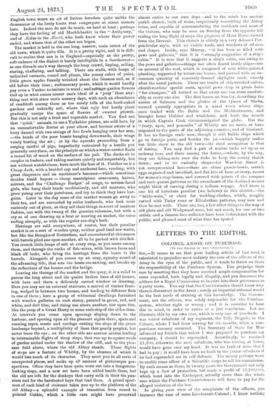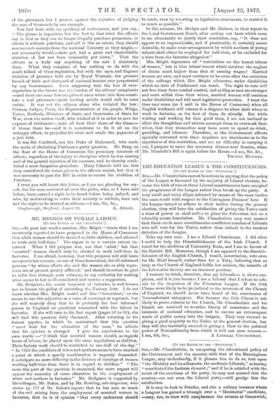LETTERS TO THE EDITOR.
COLONEL ANSON ON PURCHASE.
[TO THE EDITOR OF MR "SPECTATOR."]
SIR,—It seems to we that your leading article of last week is calculated to prejudice most unfairly the case of the officers of the Army in the eyes of the public, and it tends to throw on them the responsibility of the Purchase System. You prejudge their case by asserting that they have received ample compensation for sums expended, both legally and illegally, and you denounce the address for a Royal Commission to inquire into their grievances as a party move. You say that the Constituencies should know why there is discontent in the Army ; surely an impartial tribunal would be the best mode of arriving at this knowledge. The Govern- ment, not the oflicers, was solely responsible for the Purchase system, whether right or wrong ; and it is essential to bear this in mind, in order to arrive at a just conclusion. Let me illustrate this by my own case, which is only one of hundreds. I was senior subaltern of my regiment, the Rifle Brigade, in the Crimea, where I had been serving for six months, when a non- purchase vacancy occurred. The Secretary of State for War informed my friends that unless I was prepared to purchase my company, I should be superseded. Accordingly, he received £1,100, otherwise the next subaltern, who was serving at home, would have gone over my head. It was no fault of mine that I had to pay ; it would have been no fault in the junior subaltern if he had superseded me in self-defence. The money perhaps went to enable some officer of a Scientific corps to sell his commission. By such means as these, in twenty years the Government not only kept up a flow of promotion, but made a profit of £1,700,000, which went into the Exchequer, actually more than the whole sum which the Purchase Commissioners will have to pay for the alleged violation of the law.
In giving your view of the complaints of the officers, you instance the case of some Lieutenant-Colonel ; I know nothing
of his grievance, but I protest against the injustice of judging the case of thousands by one example.
You find fault with my speaking of retirements, and you say, " The phrase is ingenious, but the fact is, that what the officers say is that as they can no longer illegally purchase promotion, or obtain it without purchase, and sell it like an estate, they should receive such moneys from the national Treasury as they might,— not necessarily would,-s-have got, had a gross and discreditable violation of law not been summarily put down." That the officers as a body say anything of the sort I absolutely deny. What they complain of has nothing to do with the much talked of Over-regulation, but with the open and flagrant violation of promises held out by Royal Warrant, the grossest breach of faith and disregard of national honour ever perpetrated by any Government. Even supposing that the loss of over- regulation in the future was the burden of the officers' complaints —and there are some few exceptional cases where this does consti- tute a real grievance—your leading article would still be most unfair. It was not the officers alone who violated the law ; Princes, Judges, Peers, the Representatives of the people, Whigs, Tories, Radicals, Ministers of State, and Secretaries of State for War, even the nation itself, who winked at it in order to save the expense of retirements, must all bear their share of the blame— if blame there be—and it is monstrous to fix it all on the unhappy officer, to prejudice his cause and evade the payment of a just debt.
It was Mr. Cardwell, not the Duke of Richmond, who made the mode of abolishing Purchase a party question. He flung on the floor of the House of Commons the pecuniary interests of officers, regardless of the injury to discipline which he was causing and of the general injustice of his measure, and he thereby estab- lished a most dangerous precedent. Many Liberals told me that they considered the terms given to the officers unjust, but that it was necessary to pass the Bill in order to secure the abolition of Purchase.
I trust you will insert this letter, as I am not pleading for my- self, but for men scattered all over the globe, who, as I have said before, have earned a right to be heard before being judged, and who, by undertaking to serve their country as soldiers, have not lost the right to be treated as citizens.—I am, Sir, &c.,
Shuyborough, Stafford, August 20. A. ANSON.































 Previous page
Previous page